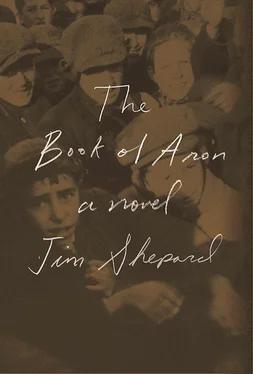“So what was he like?” I said.
“All my mother ever said about him was that he could dig money out of the ground,” she said. Some trolley brakes screeched around the bend on Chłodna and when she touched her fingers to her mouth it made me wish she was somewhere quiet and safe. “So now I was being summoned to see him, alone, and my mother was very excited and anxious and my father was angry with her for getting everyone stirred up. I remember them fussing about what I would wear and then I was delivered to a big dark house and told to go inside. An old woman opened the door and disappeared and I went up flights of stairs. I didn’t know where I was going and I had to feel my way around the landings but I could see a light on the top floor. The top floor was a long dark room with angled ceilings. At the end of it an old man with a beard sat behind a desk piled with books. Some of the stacks reached the ceiling. There were stacks on the windowsills in the dormers. There were spiderwebs everywhere, even on his lamp, so I stopped to wait for him to say something. I finally said hello but for all I knew he was deaf. He looked up and gestured for me to come closer. I ducked under the webs as I went. When I was halfway there he held up his palm and I stopped and he watched me for a while. A clock was ticking somewhere in the room. I said hello to him again, then took a step, and again he held up his palm. So I told him who I was. His face didn’t change and he waved his hand upward for me to go away. I took a step back, to see if that was really what he meant, and he went back to his reading.”
“So after all that he didn’t even talk to you?” I said.
The green and blue police lost patience and started beating Adina and Lutek on their heads. Adina put her hands over her head, so one of them beat her hands. Then he stopped and everyone went back to their posts.
“I shouldn’t even be with you, you’re so unsanitary,” Zofia said to me. I put a hand to my neck, as if I could hide the lice.
Lutek and Adina disappeared down Żelazna Street and the old woman stood there talking to herself for a few more minutes before she finally left. Once she was gone, Zofia stood up and brushed the dirt from her skirt.
“When the war started, when it came to food I was always more sly and would push through somehow, while my father and brother would stand and stand in the lines and get nothing,” she said. “My mother thinks that what keeps me going is a well of spitefulness.” She thumped her chest. “I think she’s right. I can feel it right here.”
THE TYPHUS WAS EVERYWHERE WORSE AND ZOFIA’S building was filled with it. She carried around a tin of oil and paraffin to rub on herself to keep the lice away, and wouldn’t let me sit anywhere nearby. She wouldn’t let Lutek, either, but when she told him that he said, “Who wants to?” We watched the street trading on Gęsia. In front of us a woman was selling children’s underwear and the lining from a coat. When she saw us looking, she held up what she had as though it was a pot of gold and told us she must’ve gone out of her mind because she was giving these items away for almost nothing. A beggar beside her sat on his hands and held his cup with his bare feet. We were waiting there because someone was bringing us orders to fill and he was late.
“Maybe he’s got the typhus too,” Zofia said, and Lutek said that the typhus was now the other subject he was sick of. Were we supposed to talk about nothing but food all day like him, Zofia wanted to know, and he said that he couldn’t decide who was more boring. All the rich talked about was when they were going to get the inoculation and all the poor talked about was when they were going to get the disease.
My mother asked if my friends were clean and I told her I had more lice than anyone. So she dragged me back to the sink and doused my head and neck and chest again with kerosene. My brothers, about to leave for work, held me down and cheered her on.
“You sound good,” she said, once I got free and she listened to my breathing. She told me to stay away from the quarantined streets.
Zofia said that their house sanitary warden told her father that Krochmalna Street was the main incubator in the ghetto and that the Germans had said they’d burn it down if they could.
“I’m glad no one we know lives on Krochmalna Street,” I told her.
Adina said it was fenced off now, anyway, and they were taking everyone in big trucks to the baths on Spokojna. You could see she felt sorry for Zofia, who whenever she found a louse acted like it was the end of the world.
“Do the baths work?” Zofia asked.
Adina said that she’d asked someone that but instead of answering he’d told her children and fish shouldn’t have voices.
“The baths are where you catch the lice,” Lutek said. “Or the delousing queues. And the sulfur they use doesn’t kill anything anyway.”
“Shaved like a goy,” the beggar next to the woman sneered at him. “Where are your peyes? Your family doesn’t wear any? Maybe they’re not the fashion anymore?”
“And what’re you, the Rabbi of Warsaw? Shut your mouth,” Lutek told him.
The man we were waiting for never showed up and it came time for the new business we called Catching the Trolley. We’d worked a deal with the blue policeman who escorted the number 10. Zofia had been the one to approach him. It was forbidden for Aryan trolleys to stop in the ghetto but the 10 had to slow down to make the turn onto Zamenhofa, where Adina kept watch and left her hat on if all was clear, and then Lutek and I ran out for the sacks thrown off.
We got caught one day by the green police and they chased Lutek instead of me and I hid in a shop that sold matches and cigarettes and small bottles of homemade medicine until the owner thought I was waiting to steal something and threw me out. A yellow policeman who’d been standing next to his bicycle with a young woman walked over to me. He was wearing his own jacket and trousers with the yellow uniform cap and armband. He was shorter than I was and had huge ears. He took my sleeve and asked what I had in the sack and I told him I had to leave. He smiled and held up a finger, showing off for the woman. She wasn’t very tall but she was taller than he was.
“You don’t recognize me?” he said, and then I did: he’d been one of the foremen at my father’s cousin’s factory, the one who’d sent me to the cloth-scraping. His name was Lejkin.
“I like your boots,” I told him.
“So does she,” he said, and the woman blushed. “You know what they say: a constable in shoes is only a half constable.”
I told him again that I had to go. He said I didn’t, in fact, and that I could either get on the handlebars and come with him or walk with him over to the next block, where he would tell the Germans he’d found a smuggler.
Come with him where, I asked, and he said he’d give me a ride home. I asked him why and he said that he liked doing favors for people. “We short fellows have to stick together,” he said. He strapped my sack of onions to a rack over his back wheel and tipped his cap to the woman. Then he steadied the handlebars so I could sit on them. I wanted to tell him his bicycle was too big for him but I was afraid he would turn me over to the Germans.
“See you soon,” he said to the woman and she laughed and said, “We’ll see,” as he started pedaling away.
I was so bony the handlebars hurt on the cobblestones. I couldn’t tell if any of my friends had seen what had happened.
He asked if I knew anyone else in the Jewish Order Service. I told him no. He asked if a lot of young men I knew wanted to be in the Order Service. I told him no. He pedaled for a while and then said that it was odd: he’d only gotten the job because his cousin had entered his name on a list. Someone had handed him a hat and a yellow armband and a rule book and just like that he was on duty.
Читать дальше












